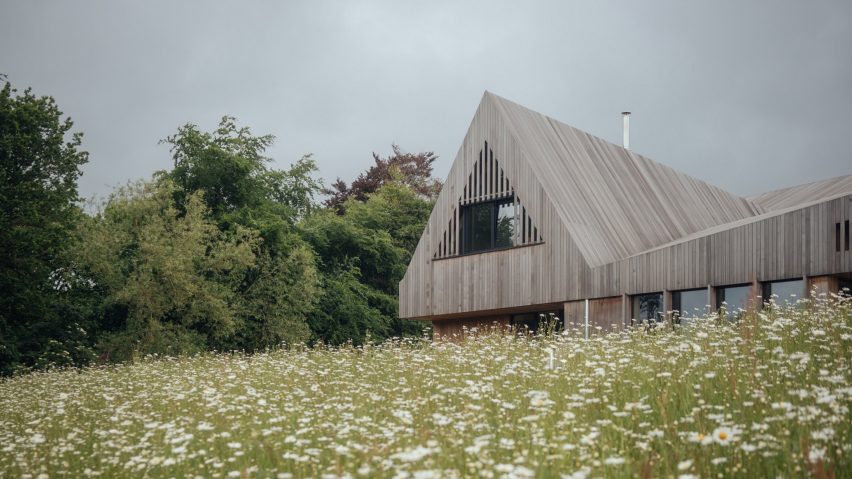Local timber-framed buildings influenced the geometric form of Water Farm, a house that architecture practice Studio Bark has added to a family farm in Suffolk.
The five-bedroom family home is constructed from wood and defined by its origami-like, wood-clad roof, which pays homage to local buildings and agricultural structures in nearby villages.
"The surrounding villages have many timber-framed buildings from various different architectural periods with many different roof pitches, gables, hips," studio founder Wilf Meynell told Dezeen.
"We want the building to feel agricultural, hence the gabled ends, but also nod to the variety of domestic roof pitches found in the local area."
Located on the edge of Dedham Vale, a designated Area of Outstanding Natural Beauty on the Essex-Suffolk border, the site features mature woodland and pasture and is dotted with hedgerows and two distinctive oak trees.
To complement these natural surroundings, the home is almost entirely coated in locally sourced sweet chestnut cladding. The cladding is broken up by large windows and floor-to-ceiling glazing, providing the family with viewpoints over the landscape.
Water Farm's angular roof folds in various directions above the building, juxtaposing its square-shaped plan and timber structure that is punctured by a central courtyard.
"The walls are timber frame sat on top of a blockwork plinth – a modern nod to the heavyweight plinths in the village – while the roof structure has been achieved using a folded plate system, where planes work together creating integral stiffness," said Meynell.
Inside, the studio aimed to maintain a balance between openness and separation, creating a stepped ground-floor plan that uses level changes to demarcate different spaces.
Here, an open circulation route wraps around the edges of the courtyard, with spaces including living rooms, a bedroom, a utility room and an open kitchen and dining space branching from it.
"To suit the client's large and sociable family, circulation was set around an internal courtyard filling the house with light and providing visual connections throughout the key spaces," said Meynell.
"Rooms and windows were positioned to capture key views to the Stour Valley and overhangs and shutters provide solar shading. Each space has a different ceiling height and feel based on its use," he continued.
The kitchen and dining space is bordered on one side by large glass doors that open onto the courtyard, which features outdoor seating areas and planting.
Completing the ground floor is an ensuite bedroom that is closed off from the rest of the plan to offer more privacy.
Upstairs, Water Farm's first floor features an L-shaped plan with four bedrooms. Gabled ends provide the two main bedrooms on either end with expansive views of the surrounding landscape.
"Where the ground floor is expressed and zoned through the stepped ground floor slab, the first-floor rooms are characterised by the striking geometry of the roof, which gives each room a unique spatial character," said the studio.
"We wanted the rooms in the roof to be super exciting," added Meynell. "All of the roof is accessible and there are even small mezzanines which have been great fun for the kids."
Textured flooring and off-white walls feature throughout the interior spaces, brightened by sculptural details and pops of colour such as suspended lights over the kitchen and deep blue joinery.
Due to the home's remote location, Studio Bark fitted the home with solar panels, a ground-source heat pump and a biofuel generator that help power and warm the home.
Low-tech and passive design strategies also form a key part of Water Farm, helping to reduce its operational carbon footprint.
"Careful position of glazing, either with overhangs or movable external shutters, provides control of solar gain in the summer," said the studio.
"The central courtyard provides a well of light and fresh air, which twinned with high ceilings and openable windows in every aspect provides daylight and natural ventilation throughout the plan."
Studio Bark was founded by Meynell in London in 2014. It specialises in sustainable building design.
Other projects by the studio include an off-grid home in Suffolk and a "fully biodegradable and recyclable" cork shed.
The photography is by Jim Stephenson.

